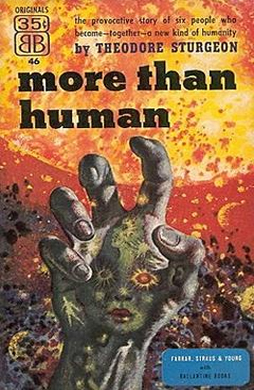
More Than Human by Theodore Sturgeon
To give a brief summary of More Than Human, we thought we’d pass along the eclectic website Shmoop’s take on the book:
“Picture it: You're a lonely weirdo with super mind-powers who links up with six similarly strange oddballs to merge—without losing your individuality or body—into a single, multiplayer life form that could run the world. Y'all don't get around to doing that, though, because you're busy a) figuring out why you killed someone, then b) erasing people's memories so the whole planet will leave you alone—until this new lonely weirdo tells your main guy that protecting humanity is a better way to live. That's More Than Human in two sentences.”
In this book, Theodore Sturgeon presents a kind of outsider ensemble cast that struggles with a very basic question: Are they here to better mankind or to destroy it? It’s a profound examination of the emotions wrapped around belonging, pathos, suspense and a certain kind of morality that cuts right through our other emotions to tweak the latent narcissist in all of us. Mostly, when in that mode, we’re all about us and what will make us feel better. In Sturgeon’s world, a narcissist would simply check his (or her) own agenda at the door and do what’s right. And wouldn’t that be at once strange and refreshing?
About Theodore Sturgeon
Theodore Sturgeon was born February 26, 1918 and died May 8, 1985. He dropped out of high school and job-hopped his way through much of his early 20s and 30s. He finally sold a short story in 1937 and became prolific after that, imagining through his unique brand of future fiction a world without sexual differences or discrimination of any kind. It is especially telling (and you have to be a Star Trek fan to appreciate this) that he wrote several episodes in which The Prime Directive is violated by Star Trek crew members. (It’s a policy of noninterference with other cultures, basically). More Than Human pulled down the 1954 International Fantasy Award as the year's best novel and the Science Fiction Writers of America ranked "Baby is Three" number five among the "Greatest Science Fiction Novellas of All Time". That was in1964. Sturgeon came in second among authors in a popularity vote that year among other authors, finishing behind Robert Heinlein.Futurist Themes:
- Gestalt Consciousness
- Individualism and Collectiveness
© Copyright 2021. All Rights Reserved. | Made and Maintained by Virtual Crayon
